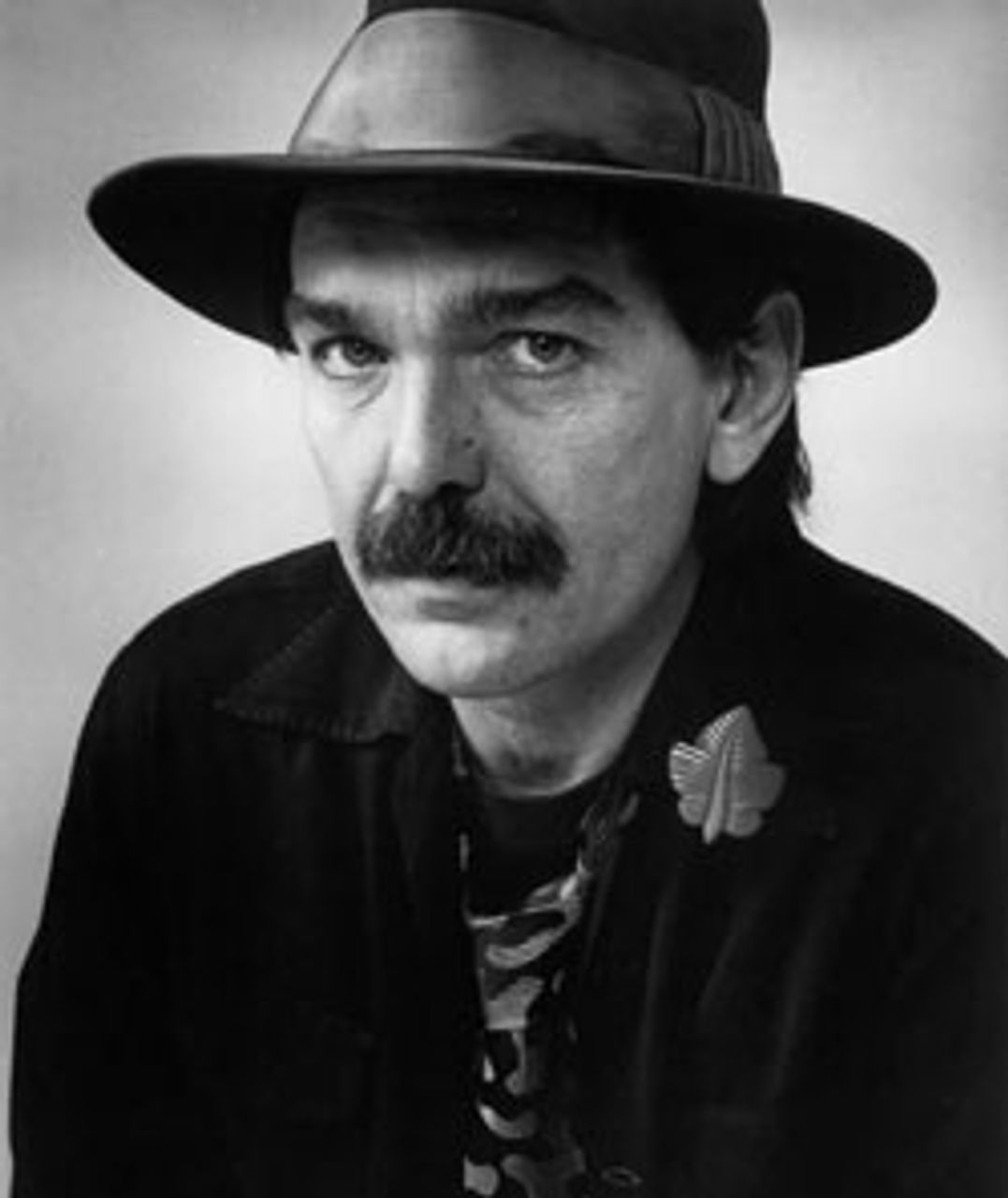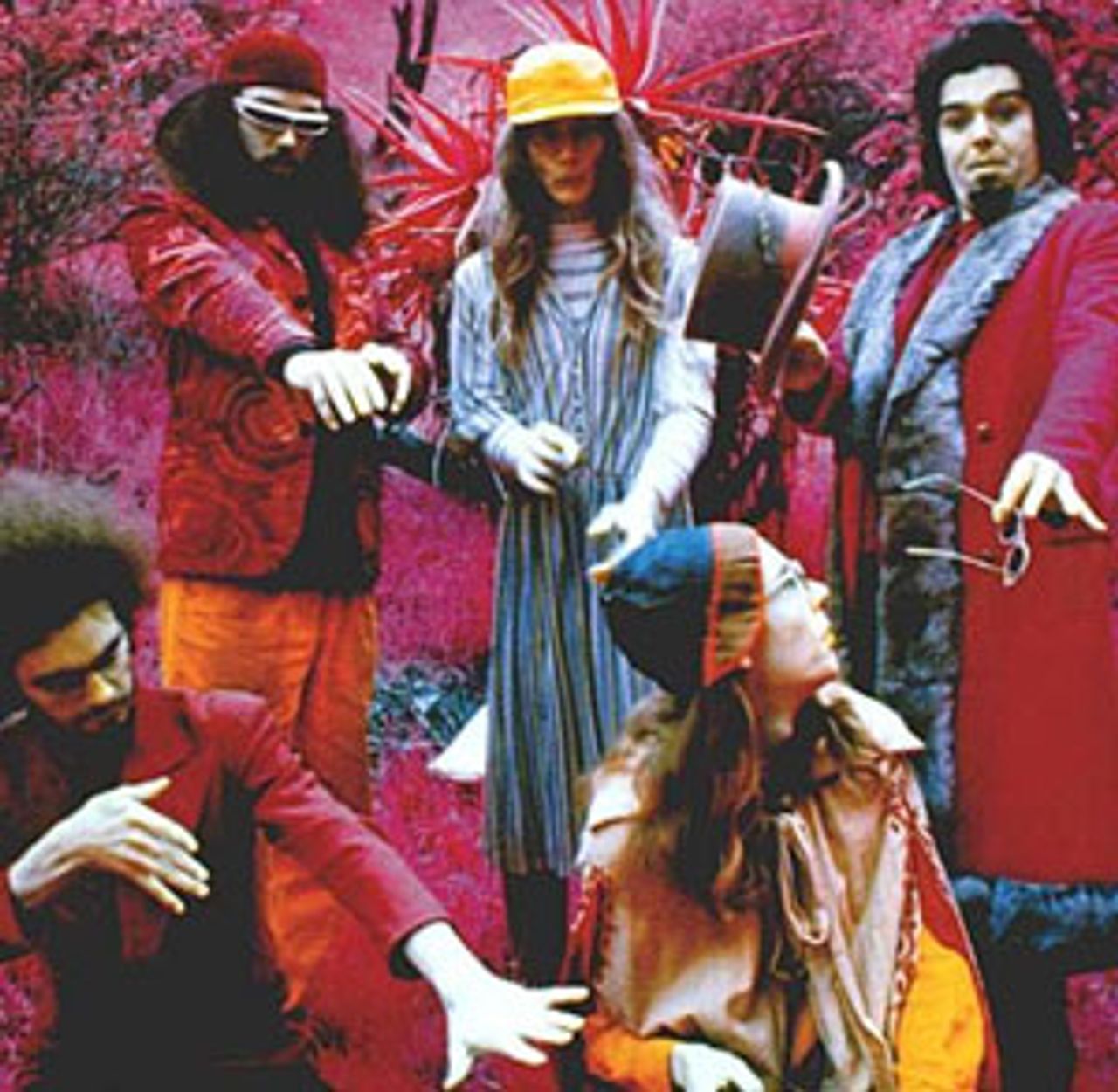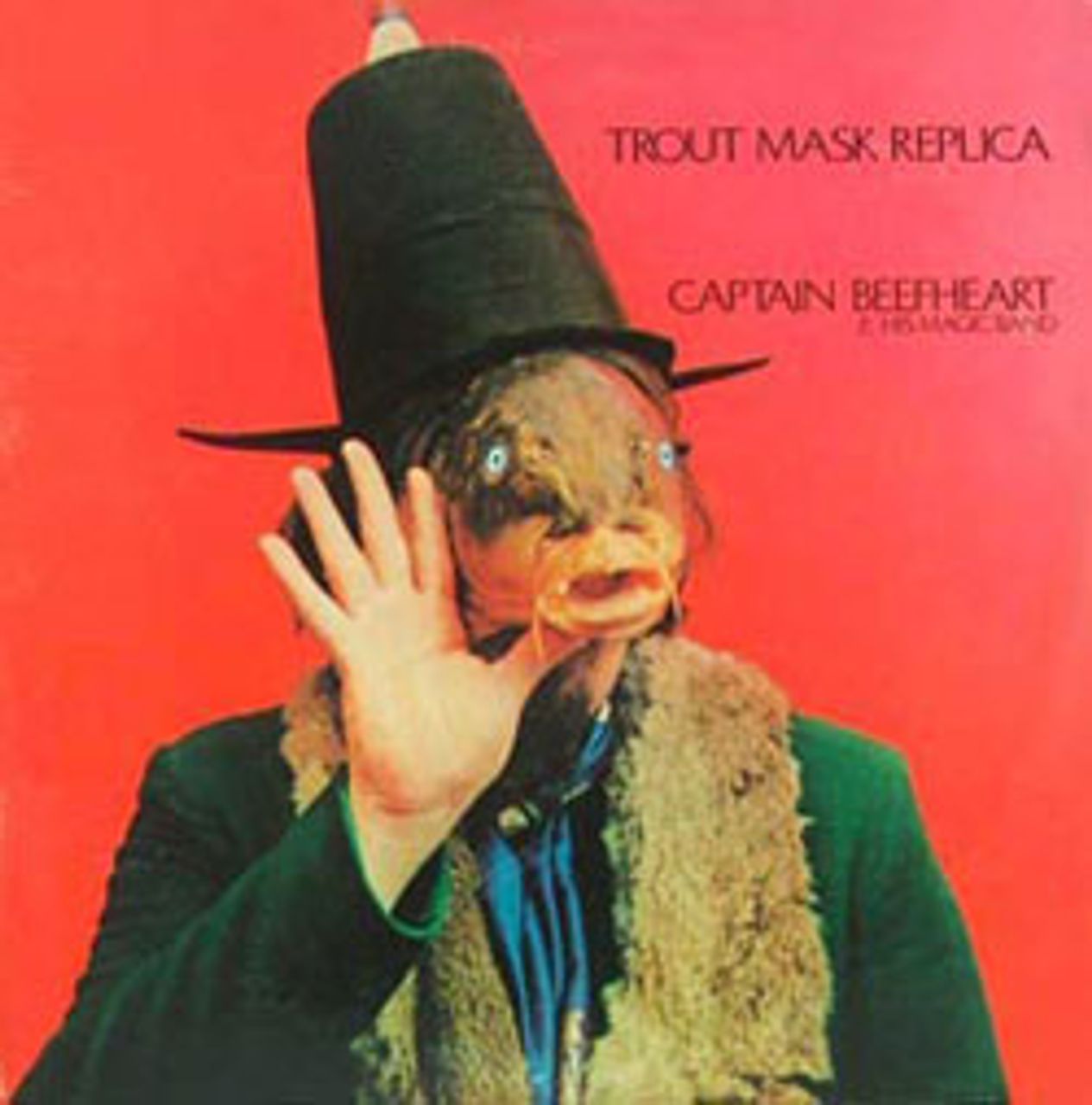 Captain Beefheart
Captain Beefheart“If you want to be a different fish, you’ve got to jump out of the school”—Captain Beefheart
Don Van Vliet, better known by his stage name “Captain Beefheart,” died on December 17, 2010 from medical complications resulting from multiple sclerosis. He was 69. Van Vliet will be best remembered for his experimental musical work from the late 1960s and 1970s. With a very distinctive voice that was heavily inspired by the famous blues musician Howlin’ Wolf, Van Vliet recorded many psychedelic rock albums with his supporting ensemble The Magic Band from 1965 to 1982. He stopped recording music to focus on his painting for the remaining decades of his life.
Of all the musical acts that came out of America and Britain in the late 1960s and early 1970s, none were more surreal and musically ambitious than Captain Beefheart and The Magic Band. While the Beatles, the Rolling Stones, and Pink Floyd seemed to push the boundaries of blues-inspired rock, Captain Beefheart aimed to deconstruct music itself. It was not so much the sound of his albums that inspired countless artists to follow in his footsteps but the idea that anything was possible in music and that there were no formal rules for artistic expression save for honesty, passion and daringness.
Van Vliet was born in Glendale, California on January 15, 1941 to Glen Alonzo Vilet, a service station owner, and Willie Sue Vilet (neé Warfield). He was artistic at a very young age and began sculpting and painting when he was three. By some accounts he only attended half a day of kindergarten.
 Captain Beefheart and his Magic Band
Captain Beefheart and his Magic BandIn a 1970 interview with Rolling Stone magazine, he spoke about his upbringing, “My mother, who I called ‘Sue’ rather than ‘mother’ because that was her real name, was walking me along a path to school—the first day of kindergarten. We came to an intersection and she walked right out into the way of a speeding car. I reached up with both hands and pulled her out of the way. She could have killed us both. It was then that I thought to myself, ‘And she’s taking me to school’.”
At age nine, he won a children’s sculpting competition organized by the Los Angeles Zoo. Despite being thought of as a child prodigy by many, his parents discouraged his sculpting, and at age 13, his family moved to Lancaster, California in the Mojave Desert.
It was here he began his lifelong affection for Delta blues music, obsessively listening to Howlin’ Wolf, Muddy Waters, as well as jazz by Ornette Coleman, Thelonious Monk and John Coltrane. After his father had a heart attack, Van Vliet dropped out of high school to help out at home. By this time he had befriend future musician Frank Zappa, who went to the same high school.
Zappa would later say in a documentary, “His father drove a Helms bread truck, part of the time Don was helping out by taking over the bread truck route [and] driving up to Mojave. The rest of the time he would just sit at home and listen to rhythm and blues records, and scream at his mother to get him a Pepsi.” His parents evidently had learned to tolerate the eccentricities of their only child.
Van Vliet enrolled in the local junior college to major in art but dropped out and for a short time managed a shoe store. “I built that chain into a thriving, growing concern,” he later recalled. “Then as a kind of art statement I quit right in the middle of Christmas rush leaving the whole thing in chaos.”
After leaving the store, Van Vliet entered the world of music by reconnecting with his old friend Zappa. He joined The Magic Band in 1965 and they released two singles the following year, one of which—“Diddy Wah Diddy” a song originally done by Bo Diddley—was a minor hit. While Van Vliet’s voice had an impressive range—reports claim something between three and seven and a half octaves—his vocal stylings were influenced by Howlin’ Wolf’s infamously deep voice.
Van Vliet would later claim that he used the name Captain Beefheart because of “a beef in my heart against this society.” Throughout his life he was known as a genuine nonconformist and an oddball, even by bohemian hippie standards.
By the spring of 1967, the group began recording their first album Safe as Milk and hired a young studio musician by the name of Ry Cooder to play guitar. Cooder explained Van Vliet’s musical method in a 1997 BBC documentary entitled “The Artist formerly known as Captain Beefheart” and narrated by acclaimed BBC DJ John Peel.
“One thing was if you sustained a groove for too long it was corny, and that was bourgeois, he didn’t want to do that,” Cooder said. “Somehow the concept seemed to be, you take the raw blues elements, like the sound of John Lee Hooker and Howlin’ Wolf, down to its purest element which is just sound, a grunt maybe, and something abstract, and then you take your John Coltrane crazy time signatures, free jazz Ornette Coleman thing, and sort of hybridize them together… Well it’s a great idea. Just to make those tunes work was a heck of a lot of work, it was not easy. Certainly none of it was written out and certainly none of it was too well understood, but that’s part of the appeal.”
The album which featured solid blues work, albeit with absurd lyrics and odd time signatures, was deemed “too negative” by their music label, A&M Records, and the band was dropped.
Van Vliet was prone to severe panic attacks during this time which caused him to cancel his performance at the world-renowned Monterey Pop Festival in 1967. While The Magic Band appeared, without Captain Beefheart on vocals they were not able to achieve the same breakthrough at the festival that other bands did such as Jefferson Airplane or Jimi Hendrix.
While virtually unnoticed in the US, the band was well received in Europe, even attracting the notice of John Lennon and Paul McCartney. DJ John Peel was a big fan of Captain Beefheart and this help explains why he was so well received in the UK, proving again the old adage that no man is a prophet in his own country.
After Safe as Milk, Van Vliet and members of The Magic Band signed on to Zappa’s Straight Records label to record their best known work, Trout Mask Replica (1969). Due to its abrasive and harsh sound, the album continues to offend many music lovers to this day. On first listen one might be forgiven for thinking that the creators of the album either had no idea how to play their instruments or that it was a parody of late ’60s “psychedelic” music and overblown studio effects.

In reality, every seemingly deranged note played by Van Vliet and his cohorts was intentional. In a radio interview he would say, “I want it exactly the way I want it, exactly. Any composer I would think would want it that way, and I don’t deviate at all. Don’t you think that somebody, like Stravinsky for instance, don’t you think that it would annoy him if somebody bent a note the wrong way?”
When reading his lyrics from Trout Mask Replica, one encounters a distinctly anti-militarist streak. Consider the song, “Dachau Blues,” a reference to the Nazi extermination camp:
Dachau blues those poor Jews
Dachau blues those poor Jews
Dachau blues, Dachau blues those poor Jews
Still cryin’ ’bout the burnin’ back in World War Two’s
One mad man six million lose
Down in Dachau blues, down in Dachau blues
The world can’t forget that misery
’n the young ones now beggin’ the old ones please
t’ stop bein’ madmen
’fore they have t’ tell their children
’bout the burnin’s back in World War Three’s
The generation that Van Vliet belonged to came of age with the memory of World War II still lingering, while newer atrocities like the Vietnam War were occurring right before their eyes.
War One was balls ’n powder ’n blood ’n snow
War Two rained death ‘n showers ‘n skeletons
Dancin’ ‘n screamin’ ’n dyin’ in the ovens
Cough ’n smoke ’n dyin’ by the dozens
Down in Dachau blues
Down in Dachau blues
Sweet little children with doves on their shoulders
Their eyes rolled back in ecstasy cryin’
Please old man stop this misery
They’re countin’ out the devil
With two fingers on their hands
Beggin’ the Lord don’t let the third one land
On World War Three
On World War Three.
In the end, Captain Beefheart and The Magic Band were nowhere near as insane the world they found themselves in. Or consider another song from the same album, “Ant Man Bee,” here Van Vliet uses the interspecies warfare of ants to make a somewhat misanthropic but amusing commentary on the human race:
Now the bee takes his honey then he sets the flower free
But in God’s garden only
Man ’n the ants
They won’t let each other be
A deeply felt concern for the environment animated a lot of Van Vliet’s artwork and outlook on life. He was an ecologist, and an eccentric one at that. During the recording of Trout Mask Replica he wanted to hire a “tree surgeon” to make sure the trees surrounding the house did not become “frightened” of the music and fall over. He was also known to give sugar to ants instead of poison.
To what end did Captain Beefheart’s experiments lead? Do we have a richer understanding of late ’60s America, let alone 21st century America, after listening to him?
In the aforementioned Beefheart documentary, Matt Groening, creator of The Simpsons, had this to say, “There’s ways of using the guitar in kind of an angular way, very atypical in rock and roll, very little distortion, very, very structured music, but a willingness to go over the top with improvisation underneath this very complicated structure. For some of us out there, this beat, (pounding his fist mechanically) the factory rhythm, the rhythm that we all march to, is very, very tedious. And one of the great things about Captain Beefheart’s music is that it breaks this rhythm, it does all that other stuff, and it gets away from that” (emphasis added).
Despite the band’s obvious talent and innovativeness they were never popular, but they did manage to inspire a legion of imitators, primarily in the Punk and New Wave styles of the late 1970s and early 1980s.
Captain Beefheart and the Magic Band went through several record labels for various reasons and Van Vliet was almost always clashing with the music establishment. For example, Lick My Decals Off, Baby (Van Vliet’s personal favorite) was not given a wider release because of a licensing dispute with Zappa’s label, and as a result the album is very rare to find today. Another album, Strictly Personal (1968), was modified without his permission to make it sound more psychedelic, but this only served to diminish the overall impact of the music, which was always dry and minimalist.
Sadly enough, Van Vliet’s musical efforts were overlooked for the most part. After recording Trout Mask Replica, the band went on to record several more critically acclaimed albums in the early 1970s, including Lick My Decals Off, Baby, The Spotlight Kid and Clear Spot. This was followed by a period of artistic decline for the band as a result of trying to go “commercial” and severely toning down their experimental tendencies.
By the late ’70s, Van Vliet formed a new version of The Magic Band, with younger musicians who would bring in new tastes and musical directions while preserving the familiar vocals of Captain Beefheart for a new generation. The trio of albums produced by Van Vliet at this time, including Shiny Beast (Bat Chain Puller) (1978), Doc at the Radar Station (1980), and Ice Cream for Crow (1982), were considered by many to be a brilliant return to form.
It should be noted, however, that many of the songs for Shiny Beast (Bat Chain Puller) were originally recorded in 1976 for an album simply titled “Bat Chain Puller.” Because that album was never officially released by Zappa’s DiscReet Records for one reason or another, the songs had to be re-recorded for the 1978 album.
In a rare television interview during this time Van Vliet explained something of his approach, “I’m doing a non-hypnotic music to break up the catatonic state... and I think there is one right now.” The music video for Ice Cream for Crow, which featured many Van Vliet paintings, however, was considered “too weird” for MTV and never shown.
It would have been interesting to see Captain Beefheart’s musical evolution into the following decades but it was not to be. Van Vliet retired from music after 1982 to focus on another passion of his, painting. His abstract style drew inspiration from the barrenness and desolation of the Mojave Desert where he spent his remaining years as a recluse. (See “Don Van Vliet at the Michael Werner Gallery” )
In addition to creating most of his Dadaist album covers, Van Vliet, whose paintings were inspired in part by abstract expressionists like Franz Kline and Willem de Kooning, was well respected within the art community. Dr. John Lane of the San Francisco Museum of Modern Art contrasted these influences with Van Vliet’s own unique style, “He is a self-taught artist and the handling of the paint is not in any traditional, technical way, beautiful. It has the same kind of edge the music has.”
While the abstract expressionists like Mark Rothko or Jackson Pollock were under the influence of chaotic, urban surroundings, Van Vliet’s art was born under the tranquillity and solitude of his desert home. And while Van Vliet’s paintings were displayed in galleries as recently as 2009 and 2010, he remained shut off from outside music. An honorable exception, however, was in 2003, when he sang “Happy Earth Day” to the tune of “Happy Birthday” for an environmental charity album. The song was 34 seconds long and recorded over the telephone.
Although much has been said about Van Vliet’s authoritarian streak, for example, forcing members of The Magic Band to live in a rented house for eight uninterrupted months and practicing 14 hours a day during the making of Trout Mask Replica (among other things), he also harbored a humane side as well.
John French, a drummer for The Magic Band, recalled, “While touring in the UK in 1975, there was a concert we played in a medium sized hall somewhere lost in time, where a bus brought in a group of about 16 wheelchair-bound individuals. After the concert ended, we were headed for our bus when Don stopped and watched as the handicapped individuals were tediously loaded one by one onto their bus. Our bus driver, a bit impatient, called out that we could go, but Don refused to budge. ‘I’m not leaving until they do. They had the patience to go through all this trouble to come see me, and I’m going to show them the same courtesy’.”
A final note: Van Vliet officially stopped making music more than a quarter century ago, yet his musical influence and stature matures with each passing year. His audience will continue to grow no doubt because the present day’s music is so tame in comparison.
